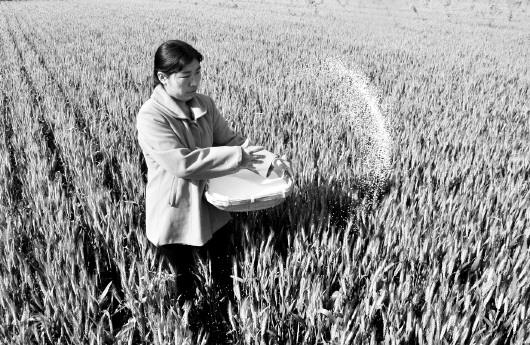The harmfulness of excessive application of chemical fertilizer

"A flower in a crop is dominated by fertilizer", which is a familiar peasant proverb. However, the data of a sample survey of farmers by relevant experts show that 80% of farmers in China are used to fertilizing based on traditional experience, blindly adopting simple fertilization methods such as "washing fertilizer with water" and "shelling" blindly without considering the characteristics of various fertilizers. Across the country, there are 1x3 farmers who apply more fertilizer than their crops need; with the increase of farmers' investment in farming, the phenomenon of "excessive fertilization, increasing production without increasing income" is also increasing in rural areas.
We must attach great importance to the harm of excessive fertilization and further improve the traditional fertilization model in China's rural areas, so as to improve fertilizer utilization efficiency, save resources and energy, ensure national food security, and protect the ecological environment. Build a new socialist countryside in which people live in harmony with nature.
One of the hazards: weakening crop production capacity
Crops are just like people, eating too much is not only bad for growth, but also bad for health. According to Professor Zhang Fusuo, head of the national expert group on soil testing and formula fertilization and dean of the School of Resources and Environment of China Agricultural University, there are two main results of excessive fertilization causing harm to crops: one is easy to lodge, and once lodging occurs, it will inevitably lead to a reduction in grain production. The other is prone to diseases and insect pests, the application of too much nitrogen fertilizer will weaken the resistance of crops to diseases and insect pests, and then increase the amount of pesticides to eliminate diseases and insect pests, which directly threatens the safety of food. China is a large agricultural country, producing and consuming more than 45 million tons of chemical fertilizer every year, while the national nitrogen use efficiency is only about 30%. In fact, grain production does not need to use so much fertilizer, the growth of crops is just like the growth of a child, when the child is a baby, he does not need to eat too much, and only when he is growing up does he need more nutrition. Crops also need to supply different amounts of nutrients at different stages. For example, winter wheat in Beijing grows very little in the four or five months after sowing in October, while the traditional fertilization method is to apply all the fertilizer for the whole growth period before sowing. In the first four or five months, crops can absorb and use less fertilizer nutrients, so there will be most of the loss and waste, while in the peak period of crop growth. Chemical fertilizer can not meet the growth needs of crops and limit the increase of grain production.
The second harm: aggravating environmental pollution
Experts have done such a survey: the nitrogen in the atmosphere with rainfall, sandstorms and other natural phenomena can reach 80 kilograms per hectare, while high-yielding wheat needs only 160-180 kilograms of nitrogen per hectare. In other words, wheat grown in the land gets nearly half of its nutrients from the atmosphere alone. If people ignore the role of these nutrients and still apply fertilizer according to the previous amount of fertilizer, it will result in overfertilization. When the amount of fertilizer applied too much exceeds the retention capacity of the soil, it will flow into the surrounding water, forming agricultural non-point source pollution, causing water eutrophication, leading to algae breeding, and then destroying the water environment. According to statistics, more than 10 million tons of nitrogen is lost to farmland every year due to unreasonable fertilization, resulting in a direct economic loss of about 30 billion yuan.
Excessive fertilizer will seep into the shallow groundwater within 20 meters, increasing the content of nitrate in the groundwater. It turned out that we thought this was a good thing. In the 1970s, farmers in many areas proclaimed that we had fertilizer and water, and as soon as the water was pumped up, we could grow crops directly, but by the mid-1980s, Europeans found that long-term drinking of nitrate-rich water was harmful to human health. Although up to now, there is still a dispute about whether nitrate is harmful to human body, one thing is certain. From the reality of the increase of nitrate content in shallow groundwater in China, the application of nitrogen fertilizer is too much.
The third harm: wasting a lot of scarce resources
Nitrogen, phosphorus and potassium are the "three elements" of nutrition for crops. Nitrogen in the atmosphere is a form of nitrogen that can not be used by most crops, which must be converted into ammonia gaseous active nitrogen by high pressure and high temperature, that is, by consuming a lot of energy, and then converted into other forms that can be used by plants as fertilizer. In the past, nitrogen fertilizer was mainly produced from oil, but now it depends on natural gas and coal. These energy sources are the scarce resources of our country. This is also one of the main reasons why the cost of chemical fertilizer production remains high.
If the wasted chemical fertilizer can be saved, it will alleviate the energy shortage in our country. In 2004, China's chemical fertilizer production consumed about 100 million tons of standard coal, more than 5 percent of the country's energy consumption; in addition, chemical fertilizer production consumed more than 100 million tons of high-grade phosphate rock each year. Phosphate rock has been listed as a shortage of resources by the Ministry of Land and Resources after 2010; fertilizer production also consumes 72% of China's sulfur resources.
We can calculate such an account: if all the natural gas produced in the country is used for the production of chemical fertilizer, it can only meet 55% of the maximum demand; if we can save the chemical fertilizer overused by farmers in developed areas and supply the areas with insufficient application of chemical fertilizer, it will increase the national grain production without increasing the total amount of fertilizer application. According to expert calculations, if the amount of excessive fertilizer applied in developed areas is reduced by 30%, and at the same time, the vast majority of farmers are allowed to apply fertilizer reasonably, it will not affect the growth of crops, but also save energy, protect the environment, and reduce the burden on farmers. It can be seen that the comprehensive promotion of scientific fertilization technology has great social, economic and ecological benefits.
Vigorously popularize the technology of soil testing and formula fertilization
Relevant survey data show that 80% of China's farmers apply fertilizer only on the basis of experience and do not pay attention to scientific methods. To this end, the Ministry of Agriculture has launched the "soil testing and Formula fertilization Action" throughout the country to further popularize the concept and technology of scientific fertilization to farmers.
According to Zhang Fusuo, the main nutrients of general chemical fertilizers are nitrogen, phosphorus, potassium, etc., because phosphorus and potassium are not easy to lose, while the activity of nitrogen is strong and easy to lose, therefore, the method of balanced monitoring of phosphorus and potassium nutrients can be adopted, and nitrogen should be regulated in real time, especially according to the law of crop growth and development and soil nutrient supply, nitrogen fertilizer should be applied in the critical period of maximum crop demand. This is the basic idea of soil testing and formula fertilization technology.
At present, farmers generally have the phenomenon of "three heavy and three light" in fertilization, that is, heavy chemical fertilizer, light organic fertilizer, heavy nitrogen phosphate fertilizer, light potassium fertilizer, heavy element fertilizer, light medium and trace elements. The technology of soil testing and formula fertilization is to grasp the status of soil fertility in time through soil testing, and according to the fertilizer demand characteristics of different crops and the requirements of agricultural production, implement balanced application of organic fertilizer and chemical fertilizer, nitrogen fertilizer and phosphorus and potassium fertilizer and medium and trace elements in order to improve fertilizer nutrient utilization efficiency and promote high yield, high quality and high efficiency of agricultural production.
PS: welcome to add your followings to Junong Toutiao account and Wechat official account. Just search for "Junong Network".
- Prev

When is the best time to use organic fertilizer?
We often say that organic fertilizer and chemical fertilizer "match" the use of good results! But not mixed together! Because commodity organic fertilizer and chemical fertilizer, urea, diammonium mixed in...
- Next

Detailed explanation of Chemical Fertilizer-- "Ferrous Sulfate"
In the agricultural material market often sees the sky blue or the green ferrous sulfate powder or the crystal, but the ferrous sulfate has the function and the use method still has many netizens not very.
Related
- Fuxing push coffee new agricultural production and marketing class: lack of small-scale processing plants
- Jujube rice field leisure farm deep ploughing Yilan for five years to create a space for organic food and play
- Nongyu Farm-A trial of organic papaya for brave women with advanced technology
- Four points for attention in the prevention and control of diseases and insect pests of edible fungi
- How to add nutrient solution to Edible Fungi
- Is there any good way to control edible fungus mites?
- Open Inoculation Technology of Edible Fungi
- Is there any clever way to use fertilizer for edible fungus in winter?
- What agents are used to kill the pathogens of edible fungi in the mushroom shed?
- Rapid drying of Edible Fungi

